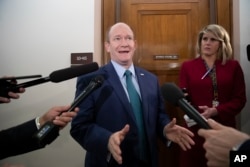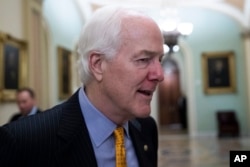U.S. lawmakers eager to castigate Saudi Arabia for killing a journalist and its conduct of a military campaign in Yemen hope the Senate soon will pass one or more measures reflecting Washington's growing anger. But they acknowledged the effort is likely to continue when a new Congress begins work in January.
Measures awaiting Senate consideration include a resolution naming Saudi Crown Prince Mohammed bin Salman responsible for dissident journalist Jamal Khashoggi's death, a resolution to end U.S. support for the Saudi-led intervention in the war in Yemen, and a bill that would suspend U.S. arms sales to Saudi Arabia and impose a variety of sanctions on the kingdom.
Strong bipartisan backing exists in the Senate for some form of action, but time is short with only weeks remaining for the current Congress, which is struggling to pass legislation that keeps the U.S. government funded.
"It's obviously a tight calendar," Connecticut Democratic Senator Chris Murphy said on Thursday, adding that the schedule is not conductive "to a long, dragged-out floor debate [on Saudi Arabia]."
"If there is going to be some coordinated action to send a strong signal, we should do so in the next two to three weeks before there is a break that will, I think, dissipate some of the focus and energy [regarding Saudi Arabia]," Democrat Chris Coons of Delaware told VOA.
Riyadh has blamed rogue agents for the slaying of Khashoggi, a U.S. resident, at the kingdom's consulate in Turkey two months ago.
Earlier this week, a select group of senators was briefed behind closed doors by CIA Director Gina Haspel on what the U.S. intelligence community knows about the journalist's death.
Multiple senators emerged saying they had no doubt about Salman's role in the incident and demanding a stronger response from Washington.
"All evidence is pointing to MBS [Mohammed bin Salman] in this horrific murder, and there is no exculpatory evidence that's been provided by anyone — it's not there, there's a reason for that," Colorado Republican Cory Gardner told VOA. "Holding MBS accountable for these actions ought to take place in the weeks and months to come."
Senate passage of either resolution on Saudi Arabia would not, by itself, force the Trump administration to take any specific actions. President Donald Trump has said responsibility for Khashoggi's death remains an open question and that terminating arms sales to Saudi Arabia would harm the U.S. economy.
Some senators are undeterred and want the chamber to go on record with a clear message to Riyadh, however symbolic it may be.
"Symbols matter," Virginia Democrat Tim Kaine said. "I think the Saudis have got it in their heads that they can do whatever they want and get away with it. And a strong Senate vote of disapproval would make them realize that they can't take for granted that they will get whatever they want up here [on Capitol Hill]."
U.S. lawmakers' unease over Saudi actions had been simmering for years as the civilian death toll in Yemen rose ever higher, but the Khashoggi killing appears to have intensified revulsion and anger toward the kingdom.
Last week, the Senate voted overwhelmingly to advance out of committee the resolution halting U.S. support for the Saudi campaign in Yemen — a measure the chamber had rejected earlier this year prior to the journalist's death.
Even so, some fear Congress could go too far in punishing Riyadh.
"We need to be careful," the Senate's No. 2 Republican, John Cornyn of Texas, said. "Saudi Arabia is fighting a proxy war against Iran in Yemen, and an overreaction, in my view, would mean that we cancel arms sales and simply abandon our ally."
Cornyn added that the United States and Saudi Arabia have shared interests, including "containing terrorism and containing Iran."
"We have two separate issues," South Dakota Republican Mike Rounds told VOA. "One is support for Saudi Arabia in their war involving Iran and their activities in Yemen. The second issue is the execution of Mr. Khashoggi in Turkey. They are separate issues, should be dealt with separately, but both have to be dealt with."
For some, action is long overdue.
"Jamal Khashoggi was murdered, not yesterday, not a week ago, not a month ago," Coons said. "And the foot-dragging and the refusal to take seriously this challenge to our basic values by the [Trump] administration is now focused and clear, and there should be a clear and focused response from the Senate."












